Related Research Articles

Blazing Saddles is a 1974 American satirical postmodernist Western black comedy film directed by Mel Brooks, who co-wrote the screenplay with Andrew Bergman, Richard Pryor, Norman Steinberg and Alan Uger, based on a story treatment by Bergman. The film stars Cleavon Little and Gene Wilder. The film received generally positive reviews from critics and audiences, was nominated for three Academy Awards and is ranked number six on the American Film Institute's 100 Years...100 Laughs list.

Melvin James Brooks is an American actor, comedian, filmmaker, songwriter, and playwright.
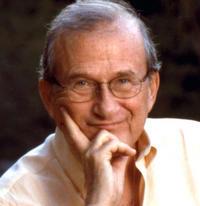
Larry Simon Gelbart was an American television writer, playwright, screenwriter, director and author, most famous as a creator and producer of the television series M*A*S*H, and as co-writer of the Broadway musicals A Funny Thing Happened on the Way to the Forum and City of Angels.
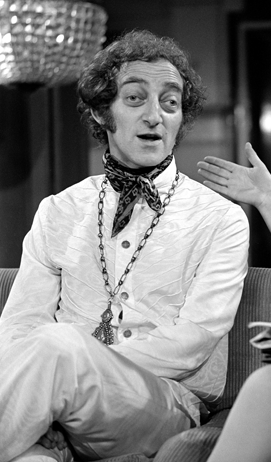
Martin Alan Feldman was a British actor, comedian and comedy writer. He was known for his prominent, misaligned eyes.

The Producers is a 1967 American satirical black comedy film written and directed by Mel Brooks and starring Zero Mostel, Gene Wilder, Dick Shawn, and Kenneth Mars. The film is about a theater producer and his accountant who scheme to get rich by fraudulently overselling interests in a stage musical purposely designed to fail. They find a script celebrating Adolf Hitler and the Nazis and bring it to the stage. Because of this theme, The Producers was controversial from the start and received mixed reviews. It became a cult film and found a more positive critical reception later.
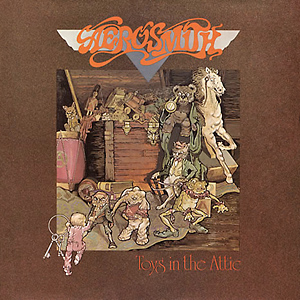
Toys in the Attic is the third studio album by American rock band Aerosmith, released on April 8, 1975, by Columbia Records. Its first single, "Sweet Emotion", was released on May 19 and the original version of "Walk This Way" followed on August 28 in the same year. The album is the band's most commercially successful studio LP in the United States, with nine million copies sold, according to the RIAA. In 2003, the album was ranked No. 228 on Rolling Stone's list of The 500 Greatest Albums of All Time. The album's title track and their collaboration with Run-DMC on a cover version of "Walk This Way" are included on the Rock and Roll Hall of Fame list of the "500 Songs that Shaped Rock and Roll".
A parody film or spoof film is a subgenre of comedy film that lampoons other film genres or films as pastiches, works created by imitation of the style of many different films reassembled together. Although the subgenre is often overlooked by critics, parody films are commonly profitable at the box office. Parody is related to satire, except that "parody is more often a representation of appreciation, while a satire is more often...pointing ...out the major flaws of an object through ridicule." J.M. Maher notes that the "difference is not always clear" and points out that "some films employ both techniques". Parody is found in a range of art and culture, including literature, music, theater, television, animation, and gaming.

Silent Movie is a 1976 American satirical silent comedy film cowritten, directed by and starring Mel Brooks, released by 20th Century Fox in summer 1976. The ensemble cast includes Dom DeLuise, Marty Feldman, Bernadette Peters and Sid Caesar, with cameos by Anne Bancroft, Liza Minnelli, Burt Reynolds, James Caan, Marcel Marceau and Paul Newman as themselves. The film was produced in the manner of a 20th-century silent film, with intertitles instead of spoken dialogue; the soundtrack consists almost entirely of accompanying music and sound effects. It is an affectionate parody of slapstick comedies, including those of Charlie Chaplin, Mack Sennett and Buster Keaton. The film satirizes the film industry, presenting the story of a film producer trying to obtain studio support to make a silent film in the 1970s.

Gene Wilder was an American actor, comedian, writer and filmmaker. He was mainly known for his comedic roles, but also for his portrayal of Willy Wonka in Willy Wonka & the Chocolate Factory (1971). He collaborated with Mel Brooks on the films The Producers (1967), Blazing Saddles (1974) and Young Frankenstein (1974), and with Richard Pryor in the films Silver Streak (1976), Stir Crazy (1980), See No Evil, Hear No Evil (1989) and Another You (1991).
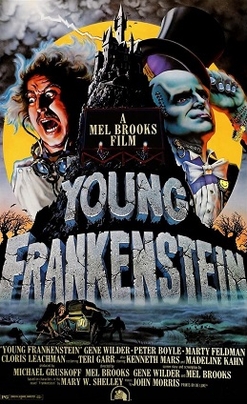
Young Frankenstein is a 1974 American comedy horror film directed by Mel Brooks. The screenplay was co-written by Brooks and Gene Wilder. Wilder also starred in the lead role as the title character, a descendant of the infamous Dr. Victor Frankenstein. Peter Boyle portrayed the monster. The film co-stars Teri Garr, Cloris Leachman, Marty Feldman, Madeline Kahn, Kenneth Mars, Richard Haydn, and Gene Hackman.

"Walk This Way" is a song by the American rock band Aerosmith. Written by Steven Tyler and Joe Perry, the song was originally released as the second single from the album Toys in the Attic (1975). It peaked at number 10 on the Billboard Hot 100 in early 1977, part of a string of successful hit singles for the band in the 1970s. In addition to being one of the songs that helped break Aerosmith into the mainstream in the 1970s, it also helped revitalize their career in the 1980s when it was covered by hip hop group Run-D.M.C. on their 1986 album Raising Hell. This cover was a touchstone for the new musical subgenre of rap rock, or the melding of rock and hip hop. It became an international hit, reaching number 4 on the Billboard charts and becoming the first hip hop single to reach the top five on the charts, and won both groups a Soul Train Music Award for Best Rap Single in 1987 Soul Train Music Awards. Both versions are in the Grammy Hall of Fame.

Robin Hood: Men in Tights is a 1993 adventure comedy film and a parody of the Robin Hood story. The film was produced and directed by Mel Brooks, co-written by Brooks, Evan Chandler, and J. David Shapiro based on a story by Chandler and Shapiro, and stars Cary Elwes, Richard Lewis, and Dave Chappelle in his film debut. It includes frequent comedic references to previous Robin Hood films, particularly Prince of Thieves, and the 1938 Errol Flynn adaptation The Adventures of Robin Hood. Brooks himself had previously created the short-lived sitcom When Things Were Rotten in the mid-1970s, which also spoofed the Robin Hood legend.
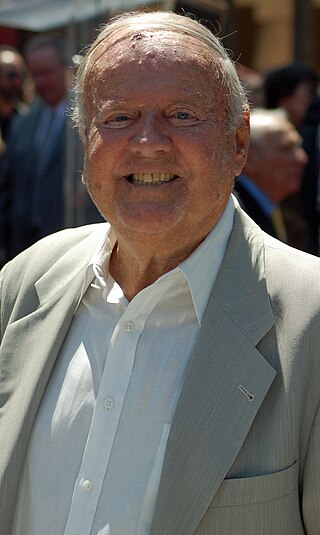
Richard Vincent Van Patten was an American actor, comedian, businessman, and animal welfare advocate, whose career spanned seven decades of television. He was best known for his role as patriarch Tom Bradford on the television series Eight Is Enough.
Will Scarlet is a prominent member of Robin Hood's Merry Men. He is present in the earliest ballads along with Little John and Much the Miller's Son.

The Adventure of Sherlock Holmes' Smarter Brother is a 1975 American musical comedy film with Gene Wilder, Marty Feldman, Madeline Kahn, Dom DeLuise, Roy Kinnear, and Leo McKern. The film was Wilder's directorial debut, from his own original script.

The Last Remake of Beau Geste is a 1977 American historical comedy film directed, co-written and starring Marty Feldman. It is a satire loosely based on the 1924 novel Beau Geste, a frequently-filmed story of brothers and their adventures in the French Foreign Legion. The humor is based heavily upon wordplay and absurdity. Feldman plays Digby Geste, the awkward and clumsy "identical twin" brother of Michael York's Beau, the dignified, aristocratic swashbuckler.
"Robin Hood and the Golden Arrow" is Child ballad 152. It features an archery competition for a golden arrow that has long appeared in Robin Hood tales, but it is the oldest recorded one where Robin's disguise prevents his detection.
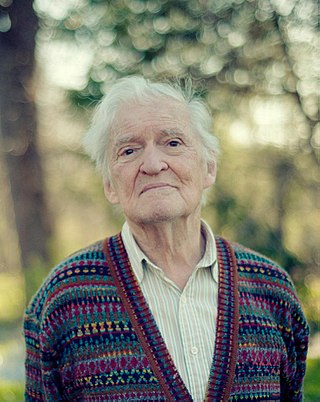
John Leonard Morris was an American film, television, and Broadway composer, dance arranger, conductor, and trained concert pianist. He collaborated with filmmakers Mel Brooks and Gene Wilder.
Taichirō Hirokawa was a Japanese voice actor and narrator. He was born in Tokyo on February 15, 1939, and died on March 3, 2008, in Shibuya from cancer. His death was announced at the beginning of the 2nd Seiyu Awards.

Friar Tuck is one of the Merry Men, the band of heroic outlaws in the folklore of Robin Hood.
References
- ↑ The Bridgemen's Magazine, Volumes 45-46, 1945
- ↑ Mazur, Eric Michael (2011). Encyclopedia of Religion and Film. ABC-CLIO. p. 92. ISBN 9780313330728.
- ↑ Mendelsohn, Daniel (21 June 2001). "Double Take". The New York Review of Books.
- ↑ Sheriff of Rottingham asks his men to "walk this way", Robin Hood: Men in tights
- ↑ Wilder, Gene (2005). Kiss Me Like A Stranger: My Search for Love and Art. Macmillan. p. 151. ISBN 9780312337063.
- ↑ Marty Feldman: Walk This Way, The Bookseller , September 13, 2011
- ↑ Ibrahim, Nur (10 August 2021). "Did the Movie 'Young Frankenstein' Inspire Title of Aerosmith's 'Walk This Way'?". Snopes.com. Snopes Media Group Inc. Retrieved 8 April 2022.